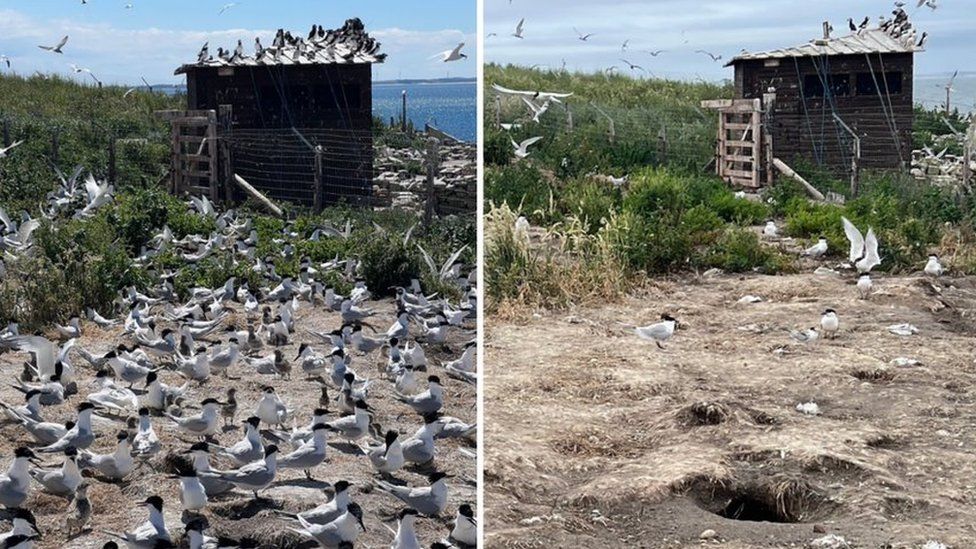Bird flu ravages tern populations at Coquet Island breeding spot
-
Published

The impact of bird flu at a breeding colony off the Northumberland coast has been described as "catastrophic".
Thousands of seabirds including the rare roseate terns, which use Coquet Island as their only nesting spot in the UK, have been killed.
Bird flu was confirmed at the sanctuary two weeks ago and is being closely monitored by the RSPB.
The island hosts colonies of roseate, sandwich, arctic and common terns, as well as gulls, kittiwakes and puffins.
The RSPB, which manages the seabird sanctuary, said conservation efforts had led to an increase in its roseate tern population from 104 breeding pairs in 2016 to an expected 160 pairs this year.
However, it said 70% of the terns' nests had so far been lost and the figure was increasing daily.
The charity is closely monitoring the virus on the island to try to stop its spread.
Paul Morrison, who has worked on Coquet Island for 38 years - first as a volunteer and now as site manager - said he had never known anything like it before.
"It's been happening in front of my eyes and I'm heartbroken, this year we were heading for a record year, we'd done the data counts across all the species and we were feeling optimistic and then along comes the virus."
Mr Morrison added: "Everyday our wardens are having to put on full PPE and collect hundreds of dead chicks and their parents.
"Of the 2,000 nesting pairs of sandwich terns alone we believe up to 4,000 chicks will have died."
The eight-hectare site is home to about 83,000 nesting sea birds, making it one of the most densely-populated places in the world for terns.
The virus has hit the main breeding season - with terns arriving from April - with nesting hitting a peak in May before the adults and fledglings head off in July and August.
Earlier this month the Farne Islands closed to visitors amid fears about bird flu, with the National Trust saying it had "no other choice" after rangers found significant numbers of dead birds.
Mr Morrison added his teams were burying the birds on the island.
"It doesn't make sense to take infected birds to the mainland so we've got permission to have them buried here, it's just grim watching one of the volunteers digging pits every day."
He hopes some of the birds without the virus will fledge in time to move on - and volunteers have separated the different colonies with fencing, which prevents the chicks from moving around, but sadly the fences can not stop the adult birds flying and spreading the virus.
A number of dead birds have been taken to the mainland under controlled conditions to laboratories where experts from Defra and the Animal and Plant Health Agency (APHA) are carrying out tests as part of a nationwide wild bird surveillance programme.
Defra said it hoped the ongoing tests would shed light on how the disease was distributed geographically.
People along the north-east coastline have been told not to touch or allow their dogs to go near any dead or sick seabirds they find.
Follow BBC North East & Cumbria on Twitter, Facebook and Instagram. Send your story ideas to northeastandcumbria@bbc.co.uk.
Related Topics
-
-
Published2 July 2022
-
-
-
Published1 July 2022
-
-
-
Published14 June 2022
-
-
-
Published8 June 2022
-